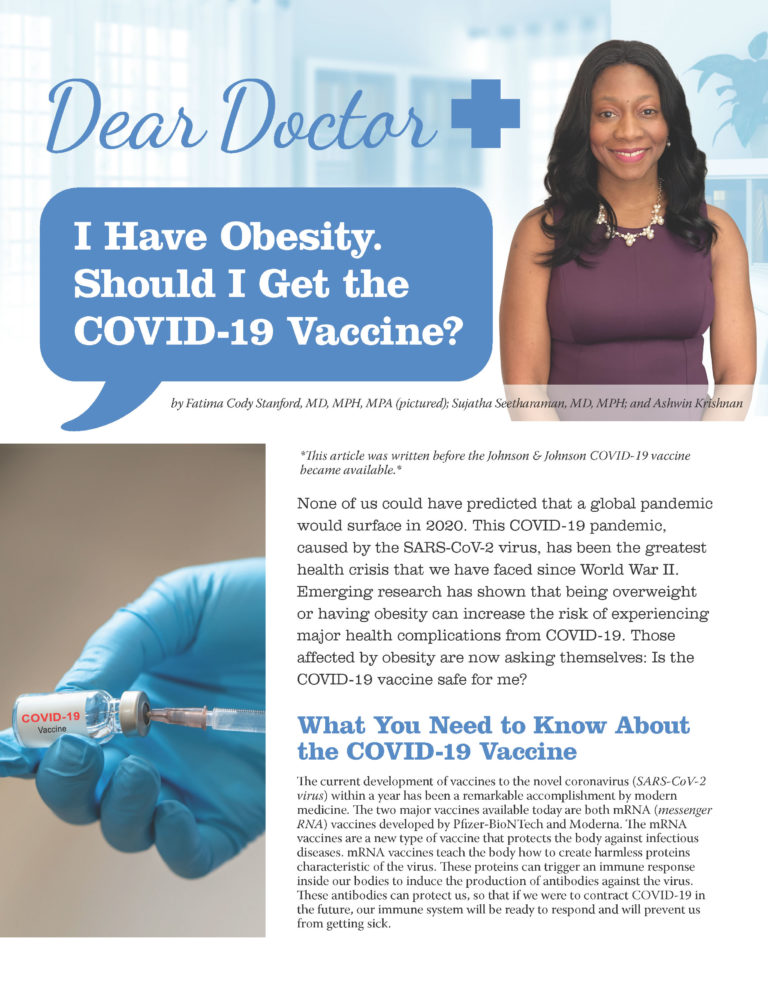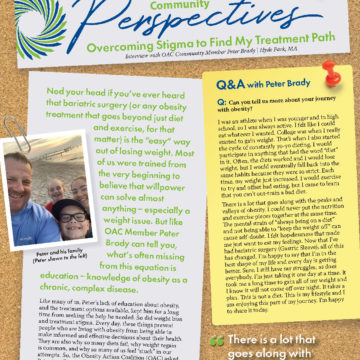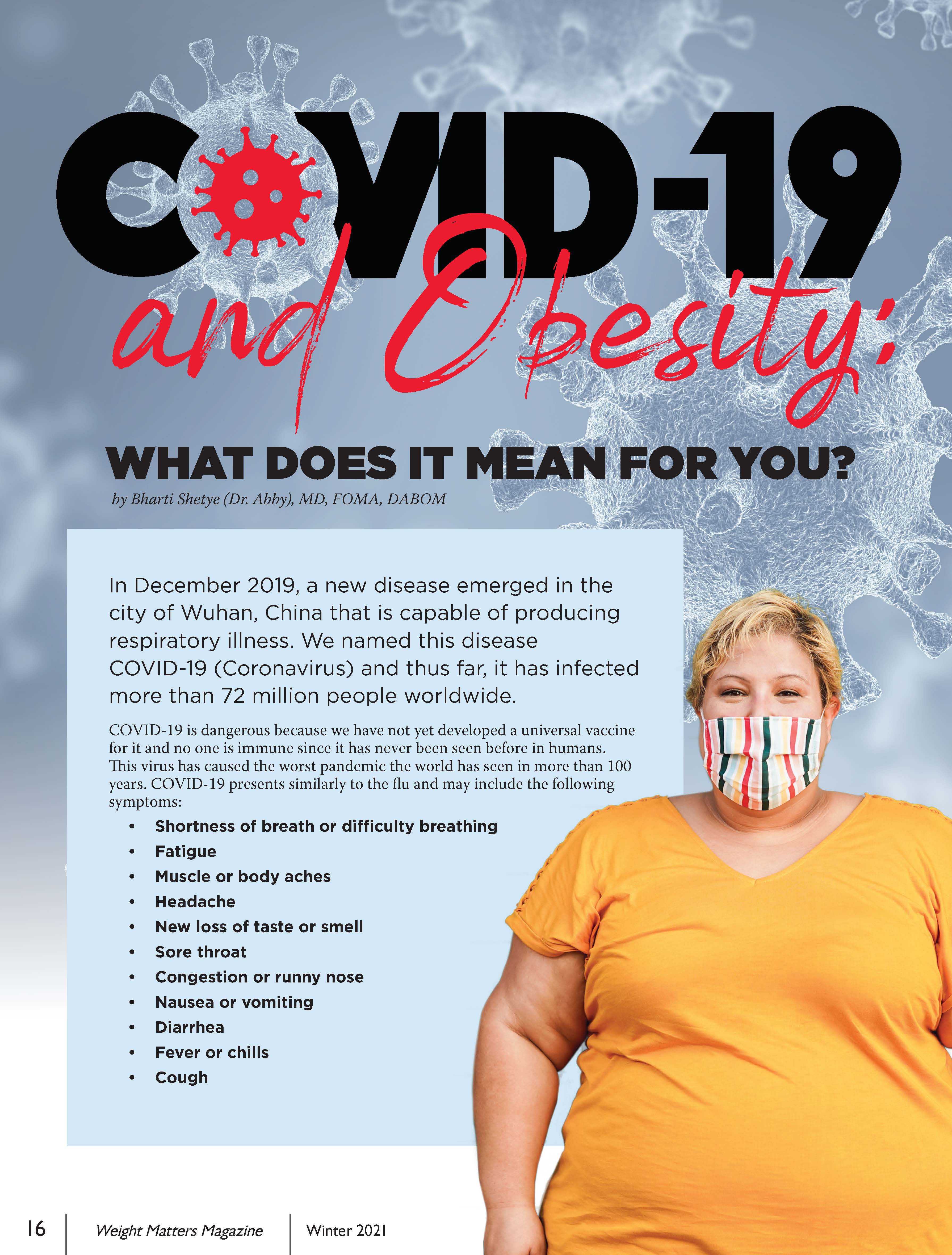Dear Doctor: I Have Obesity. Should I Get the COVID-19 Vaccine?


by Fatima Cody Stanford, MD, MPH, MPA (pictured); Sujatha Seetharaman, MD, MPH; and Ashwin Krishnan
Spring 2021
*This article was written before the Johnson & Johnson COVID-19 vaccine became available.*
None of us could have predicted that a global pandemic would surface in 2020. This COVID-19 pandemic, caused by the SARS-CoV-2 virus, has been the greatest health crisis that we have faced since World War II. Emerging research has shown that being overweight or having obesity can increase the risk of experiencing major health complications from COVID-19. Those affected by obesity are now asking themselves: Is the COVID-19 vaccine safe for me?
What You Need to Know About the COVID-19 Vaccine
The current development of vaccines to the novel coronavirus (SARS-CoV-2 virus) within a year has been a remarkable accomplishment by modern medicine. The two major vaccines available today are both mRNA (messenger RNA) vaccines developed by Pfizer-BioNTech and Moderna. The mRNA vaccines are a new type of vaccine that protects the body against infectious diseases. mRNA vaccines teach the body how to create harmless proteins characteristic of the virus. These proteins can trigger an immune response inside our bodies to induce the production of antibodies against the virus. These antibodies can protect us, so that if we were to contract COVID-19 in the future, our immune system will be ready to respond and will prevent us from getting sick.
While there is still uncertainty surrounding COVID-19, people have a lot of questions regarding the vaccine. Luckily, we have those answers:
What are the benefits of getting vaccinated?
Data from clinical trials have shown that COVID-19 vaccines can be highly effective in preventing COVID-19 infection and can particularly keep us from getting seriously ill, even if we do contract the virus.
Is the COVID-19 vaccine effective for people with obesity?
According to the Food and Drug Administration (FDA), both the Pfizer-BioNTech and Moderna COVID-19 vaccines have been proven to be equally effective in individuals with obesity versus those without obesity.
Are the vaccines safe?
Large clinical trials conducted by the manufacturers on several thousands of participants have shown that the COVID-19 vaccines are safe and effective. The studies done by the FDA have shown that the benefits of receiving the vaccine far outweigh the risks associated with a severe case of the COVID-19 infection.
How is the vaccine administered?
The Pfizer-BioNTech vaccine is administered in two 0.3 mL doses, each delivered intramuscularly (through the muscle) through an injection to those 16 years of age and older. Each dose of the Pfizer-BioNTech vaccine is given 21 days apart.
The Moderna vaccine is administered in two 0.5 mL doses, each delivered intramuscularly through an injection to those 18 years and older. Each dose of the Moderna vaccine is given 28 days apart.
Are there any side effects to the COVID-19 vaccine?
For both vaccines, the most common side effects reported were:
- Pain at the injection site
- Arm soreness
- Nausea
- Vomiting
- Fatigue
- Fever
- Headache
- Chills
- Body aches
- Swollen lymph nodes (in the same arm as the injection)
Side effects of the COVID-19 vaccine were reported more often after the second dose of the vaccine compared to the first dose.
Is there any reason someone should not receive the COVID-19 vaccine?
According to the Centers for Disease Control (CDC), anyone who experienced a severe allergic reaction to their first dose of any COVID-19 mRNA vaccine should not receive their second COVID-19 vaccine.
There are two substances in both vaccines that someone may be allergic to as well:
- Polyethylene Glycol – A liquid or waxy solid used in medicine to make them stay in the body longer.
- Polysorbate – Used as an emulsifier/stabilizer in vaccines.
People with a history of allergies involving the above substances should consider a consultation with an allergist/immunologist to determine whether they should receive the vaccine.
Will the vaccine prevent me from getting the coronavirus?
The COVID-19 vaccine will not prevent you from getting the virus, but it can help decrease the severity of the illness if you do end up contracting the virus.
How much does the vaccine cost?
The federal government is providing the COVID-19 vaccine free of cost.
Should I still take precautionary measures after receiving the vaccine?
Yes, it will take a long time until enough of the population is vaccinated and protected from the virus before we can stop taking precautionary measures.
Should I receive the COVID-19 vaccine in the event of a prior history of COVID-19 infection?
The CDC recommends that the COVID-19 vaccine be given to individuals even if they have already had a COVID-19 infection due to the severe health consequences associated with the virus and due to the possibility of a re-infection.
Conclusion
Although we can all certainly celebrate these speedy innovations, we must remember that no vaccine provides 100% protection. Based on evidence from clinical trials done by the CDC, the Pfizer-BioNTech vaccine was 95% effective and the Moderna vaccine was 94.1% effective against preventing COVID-19 infection. Therefore, it is important for us to continue to practice effective precautionary measures put forth by public health and medical experts such as social distancing, wearing our masks and frequent hand washing.
About the Authors:
Fatima Cody Stanford, MD, MPH, MPA, is a fellowship-trained obesity medicine physician and scientist at Massachusetts General Hospital and Harvard Medical School who received her BS and MPH from Emory University as a MLK Scholar, her MD from the Medical College of Georgia School of Medicine as a Stoney Scholar, and her MPA from the Harvard Kennedy School of Government as a Zuckerman Fellow in the Harvard Center for Public Leadership.
Sujatha Seetharaman, MD, MPH, is a fellowship-trained obesity medicine physician, a board-certified pediatrician and an adolescent medicine physician. She has been in clinical practice for the past 23 years and recently completed her obesity medicine fellowship at the Massachusetts General Hospital, MA.
Ashwin Krishnan is a sophomore at Emory University, Atlanta, GA. He is majoring in neuroscience and behavioral biology with the intent of pursuing a career in medicine. He is very passionate about the field of obesity medicine as well as research into solving disparities in health outcomes.
by Bharti Shetye (Dr. Abby), MD, FOMA, DABOM Winter 2021 In December 2019, a new disease emerged…
Read Article






